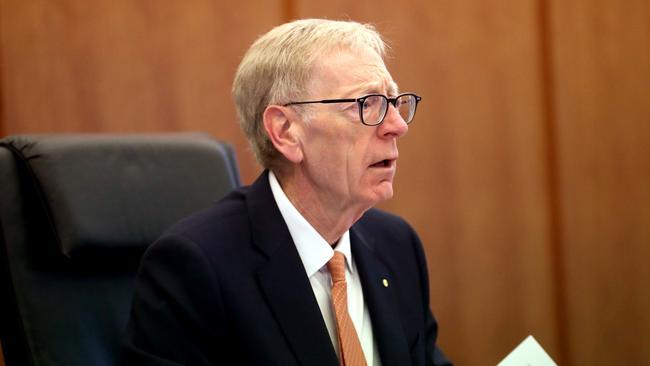
The Hayne final report gives the 2019 election a devastating framing — who is responsible for a bank and financial system plagued by systemic misconduct and who is best to fix it?
Josh Frydenberg pledged action on all 76 recommendations, said restoration of trust was the priority and “the banking sector must change and change forever” — essential steps to protect the Coalition from the fatal danger of untenable ethical misbehaviour on its watch.
While the Morrison government and Labor were on the same page in offering broad endorsement of the Hayne recommendations, Bill Shorten inherits a powerful legacy — Labor is vindicated in its call for the royal commission and will deploy its findings as condemnation of the government that resisted this inquiry for so long.
The government seeks to win an election on economic management but must live with a royal commission report revealing sustained financial misconduct, unethical behaviour and a system operating against the interests of customers and consumers.
How does this reconcile with superior economic competence? Opposition Treasury spokesman Chris Bowen called it “the report Scott Morrison never wanted delivered”.
The report documents the failure of an entire industry — Kenneth Hayne lays the prime responsibility on the financial institutions “and those who managed and controlled those entities: their boards and senior management”. This is public betrayal on a grand scale. It arises in “the asymmetry of power” between the institutions and people. The Prime Minister and Treasurer got on the front foot as much as possible. Frydenberg said conduct was driven by “greed”, laws were broken and trust “has been lost”.
They pledged an ethical restoration, stronger protection for consumers, small business and farmers. Their plans involve a compensation scheme of last resort to cover claims going back 10 years. People who had an unpaid prior determination in their favour can be compensated — this will see 300 consumers receive a total of $30 million.
Hayne’s report strikes a complex balance: it seeks a shift in culture, referrals on possible criminal and legal issues, more customer protection and sweeping reforms of the regulatory system, yet is prudent enough to shun more structural and interventionist remedies. This is a document of ethical and philosophical depth yet the conundrum remains: will systemic reform be achieved and what will be the price?
Perhaps Hayne wonders this himself. He says unwillingness by the institutions to accept responsibility for misconduct has dominated this saga and, incredibly, says this unwillingness remains. Witness his criticism of the leadership of the NAB, with Hayne saying: “I was not persuaded that NAB is willing to accept the necessary responsibility for deciding, for itself, what is the right thing to do.”
This report documents how trust in the financial system has been smashed. Frydenberg rightly embraced this conclusion. Given this, can the public trust the Morrison government? It is a big ask.
The government must get the public to focus on future solutions, not the failed past. The collective obligation on the political and financial system is huge: to preserve financial stability, ensure people still get their home loans but preside over an ethical and regulatory transformation.
Major Liberal-Labor differences on banking policy are unlikely, given the quality of Hayne’s report, but the party conflict will be intense.
It will revolve around responsibility, blame, failed regulators, past government denial and managing the explosive issue of public betrayal without provoking counter-productive credit contraction.
The government has no time before the election for a full legislative response. If Shorten wins the election, then Labor has charge of implementation. Bowen was measured in his response yesterday, saying Labor accepted “in principle each and every recommendation” and did not rule out going further.
Both government and Labor need to be tested on their pledges.
Frydenberg made clear the government’s reservations on the extent to which the role of mortgage brokers should be scaled back and the risk of anti-competitive consequences.
Labor will need to be tested on the unqualified recommendation that in superannuation a person “should only have one default account” — an assault on the vested interests of the industry super funds.
Frydenberg declared confidence in ASIC to take criminal proceedings. A review of APRA will be held by Graeme Samuel and repeated each four years. The government will amend legislation before the parliament to impose obligations with penalties upon trustees as well as directors.
Critically, Hayne rejected the defence that sole pursuit of profit is justified by shareholder accountability. He said: “Financial returns to shareholders will always be an important consideration but it is not the only matter to be considered. It is not right to treat the interests of shareholders and customers as opposed. Some shareholders may think it right to look only to the short term.
“The longer the period of reference, the more likely it is that the interests of shareholders, customers, employees and all associated with any corporation will be seen as converging on the corporation’s continued long-term financial advantage. Regardless of the period of reference, the best interests of a company cannot be reduced to a binary choice. And financial services entities are no different.”




